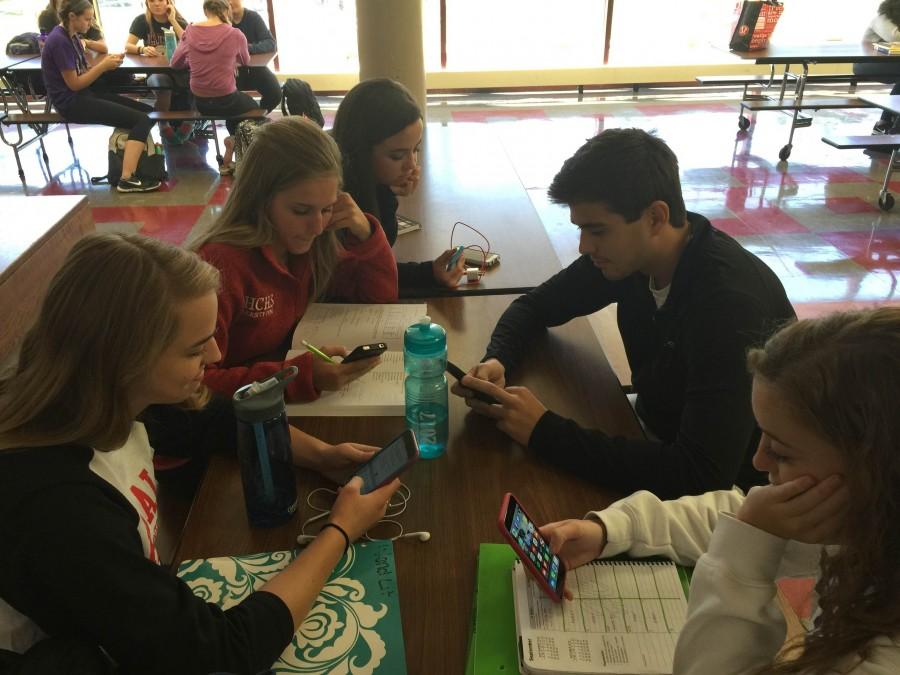Get off your phone
Students check their phones during study hall.
Snapchat, Facebook, Twitter, Instagram, Vine, updates. What if I told you that these social networking sites are actually hurting you? Maybe not physically, but they are hurting the way we interact with one another and our families. Constantly checking our phones for the latest post or tweet, or waiting for a text back from someone can create stress. The people that are typically most addicted to their phone are teenagers.
In an article by Pew Research Center titled Teens, Social Media & Technology Overview 2015 by Amanda Lenhart, “ Aided by the convenience and constant access provided by mobile devices, especially smartphones, 92 percent of teens report going online daily.”
And although teenagers might not care about the way they interact with other people, they will when they are older and when they can no longer depend on their phone to talk to someone. Technology will keep advancing and I feel that as more and more new savvy devices and apps come out, the more teens will be drawn to their phones. This ‘addiction’ will only get worse and so will relationships with family and friends as well as stress levels. The trend of teenagers being too drawn to their phone is bad and needs to stop.
Being a teenager comes with a lot of stress from schoolwork, to extracurricular activities, to normal high school drama. However, there is an extra stress factor that most teenagers don’t even know is straining them. High cell phone usage. High cell phone usage creates an increase in stress levels. All of the rings, tones, and other sounds our phone makes can make us anxious for what’s going to appear on the screen when we press that power button.
With all the stress that comes from one of the most rigorous curriculum in the state, why add more just because you want to send your friend a funny face on Snap Chat or Tweet about how horrid Taylor Swift is.
In an article by Livestrong titled How Do Cell Phones Negatively Affect the Health of Teens? by Kristen Berry, a psychologist and writer for PBS, named Suzanne Phillips stated that “texting is instantly gratifying but it’s also anxiety producing”.
Although getting a text or any reply back from a person might be ‘gratifying’, it produces stress for people to always be available. Another aspect of a teenager’s life that is being impacted by this trend is relationships with family and friends. Constantly using your phone you begin to focus on that more than those who are close to you and it can hurt face-to-face interactions. For example, say you and your friends are having a conversation about a movie or TV show and you have trouble remembering what actor played a certain character. Well, instead seeing who the first one is to think of the person, everyone’s initial thought is ‘just look it up on Google’. Then the, what was, exciting conversation about the movie is over in less than a minute and you find yourself thinking of something else to say.
In an article by Scientific American titled How Your Cell Phone Hurts Your Relationships by Helen Lee Lin, studies were done by Andrew K. Przybylski and Netta Weinstein, professors at the University of Essex, which “showed that our phones can hurt our close relationships”. If you want to keep your friends close and your family closer, put down the phone.
In today’s society it is truly hard for teenagers to live without cell phones. We need cell phones to let our parents know where we are; keep our social status up, or sometimes even for class. Nevertheless, the use of cell phones should definitely be minimized for it creates unneeded stress, and hurts relationships with our friends and family. My hope is to one day live in a society that will not need a cell phone every minute of our lives. At the same time I realize this is very unlikely to happen, for we have already become too reliant on our technology and would be hard to go back to the old ways. For right now, my goal is to inform teenagers of this habit and hopefully they will understand the dangers.

Senior Alex Herbst is a photographer for Devils' Advo. He enjoys spending time with his friends, watching movies, and spending time outside. Alex is...













